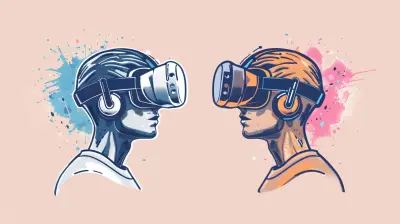Fitness Trackers and Mental Wellness: Tracking Stress and Meditation
24 April 2025
In today’s fast-paced world, stress is almost like an unwanted roommate—it’s always there, lingering, and sometimes overstaying its welcome. But what if I told you that a tiny device on your wrist could help you manage it better? Yep, I’m talking about fitness trackers!
These nifty gadgets are no longer just about counting steps or measuring heart rates; they’re diving deep into mental wellness, tracking stress levels, and even guiding you through meditation sessions. So, let’s buckle up and explore how fitness trackers are revolutionizing mental well-being!
![]()
🏃♂️ The Evolution of Fitness Trackers
Not too long ago, fitness trackers were all about physical health—how many steps you walked, how many calories you burned, and whether you hit your daily workout goal. But as technology advanced, they evolved into powerful tools that monitor overall well-being, including mental health.Now, with sensors that detect heart rate variability (HRV), skin temperature, and even blood oxygen levels, these devices can give you a pretty good idea of how stressed—or relaxed—you are.
![]()
🤯 Can a Fitness Tracker Really Measure Stress?
Absolutely! But before you start doubting how a tiny gadget can tell if you're stressed, let’s break it down.Fitness trackers estimate stress levels primarily through Heart Rate Variability (HRV)—the time gap between consecutive heartbeats. A high HRV usually indicates relaxation, while a low HRV suggests stress or fatigue.
Some advanced trackers even combine these readings with other factors like:
- Skin temperature – Stress often raises body temperature slightly.
- Breathing rate – Shallow, rapid breaths can indicate stress.
- Sleep quality – Poor sleep can be a sign of prolonged stress.
With all this data, your tracker can give you a real-time stress score, helping you spot patterns and make lifestyle adjustments.
![]()
😰 Stress Tracking: Why It Matters
We all experience stress—it’s part of life. However, chronic stress can lead to fatigue, anxiety, and even serious health issues like heart disease. This is why monitoring stress levels isn’t just a gimmick; it’s an essential part of self-care.By tracking stress daily, you can:
✔ Identify stress triggers (work deadlines, poor sleep, caffeine overload)
✔ Understand how your body responds to stressors
✔ Take timely action (meditation, breathing exercises, short breaks)
✔ Improve overall mental and physical well-being
Essentially, your fitness tracker acts like a tiny life coach on your wrist, nudging you toward a healthier lifestyle!
![]()
🧘 Meditation & Mindfulness: The Role of Fitness Trackers
If stress tracking is like holding up a mirror to your emotions, meditation is the soothing remedy. And guess what? Many fitness trackers now come with built-in meditation and breathing exercises to help you calm your mind.How Do Fitness Trackers Support Meditation?
🥰 Guided Breathing Sessions – Trackers like Fitbit and Apple Watch offer guided breathing exercises that sync with your heart rate, helping you slow down and focus on the present.🛌 Sleep & Relaxation Mode – Some trackers analyze your sleep cycles and suggest wind-down meditations before bedtime. A great way to drift off peacefully!
📱 App Integration – Most fitness trackers pair with apps like Calm, Headspace, and Fitbit Relax to provide structured mindfulness practices.
So whether you're new to meditation or a seasoned yogi, these features can keep you on track and help you develop a consistent mindfulness routine.
🔥 Popular Fitness Trackers for Mental Wellness
If you're on the hunt for a tracker that prioritizes mental well-being, here are some top picks to consider:1. Fitbit Sense 2
✅ Advanced stress tracking using HRV✅ Built-in electrodermal activity (EDA) sensor for stress response detection
✅ Guided breathing & meditation features
2. Apple Watch Series 9
✅ Mindfulness app with breathing exercises✅ Heart rate tracking with notifications for high/low patterns
✅ Sleep tracking with relaxation reminders
3. Garmin Venu 2
✅ Monitors stress levels throughout the day✅ Guided breathing exercises
✅ Tracks sleep & body battery levels
4. Whoop Strap 4.0
✅ Continuous HRV monitoring✅ Sleep, recovery, and strain analytics
✅ Personalized stress management insights
5. Oura Ring
✅ Tracks stress via HRV & body temperature✅ Sleep optimization for better recovery
✅ Meditation and mindfulness insights
Each of these devices brings a different approach to stress management, so choose one that fits your lifestyle best!
📊 How to Use Your Fitness Tracker to Improve Mental Wellness
Okay, having a fitness tracker is great, but how do you actually use it to improve your mental health? Here are some practical tips:1. Check Your Stress Levels Daily
Make it a habit to glance at your stress score every day. If it's consistently high, it's time to reassess your lifestyle and incorporate more relaxation techniques.2. Use Guided Breathing Exercises
Most fitness trackers have a breathing exercise feature. Even just two minutes of deep breathing can significantly lower stress levels.3. Track Your Sleep Quality
Good sleep is crucial for mental wellness. Use your tracker to monitor your sleep cycles and make adjustments if needed—this could mean adjusting your bedtime or reducing screen time before bed.4. Set Mindfulness Reminders
Many trackers allow you to set reminders for taking deep breaths, standing up, or even meditating for a few minutes. These little nudges can keep you on track throughout the day.5. Pair It With a Meditation App
If you struggle with maintaining a meditation habit, syncing your tracker with mindfulness apps like Calm or Headspace can provide structure and keep you accountable.🌟 The Impact of Fitness Trackers on Mental Well-Being
So, do fitness trackers really help with mental wellness? The answer is a resounding YES! These devices make stress and mindfulness measurable, which, in turn, helps us take proactive steps toward better mental health.By incorporating stress tracking and mindfulness tools into daily life, fitness trackers can serve as powerful allies in the battle against anxiety, burnout, and fatigue.
🎯 Final Thoughts
At the end of the day, we all want to feel better—physically and mentally. Fitness trackers aren’t a magic wand, but they do provide valuable insights that can help you make smarter, healthier choices. Whether it’s through stress tracking, guided meditation, or sleep optimization, these tiny wrist companions are changing how we approach mental wellness.So, if you haven’t already, maybe it’s time to explore how a fitness tracker can help you stress less and live more!
all images in this post were generated using AI tools
Category:
Fitness TrackersAuthor:

Gabriel Sullivan
Discussion
rate this article
8 comments
Kova Hines
Imagine tracking your zen like a pineapple on a pizza—controversial yet delightful! Fitness trackers can turn our stress into data points, transforming meditation into a competitive sport. Who knew finding inner peace could involve Bluetooth and notifications? Namaste and tech on!
May 10, 2025 at 12:09 PM

Gabriel Sullivan
Thank you for your insightful comment! It's fascinating how technology can blend with mindfulness, turning our pursuit of inner peace into a measurable journey. Namaste indeed!
Opal Lopez
Data empowers mindful living.
May 5, 2025 at 10:28 AM

Gabriel Sullivan
Absolutely! Data provides insights that help us make informed decisions about our health and wellness, fostering a more intentional and mindful lifestyle.
Luma McCarty
Absolutely loved this article! It's inspiring to see how fitness trackers can boost mental wellness by helping us manage stress and embrace mindfulness. Keep shining! 🌟
May 1, 2025 at 7:00 PM

Gabriel Sullivan
Thank you so much! I'm thrilled you found the article inspiring. Your support means a lot! 🌟
Ainsley Brown
Finally, a gadget that tracks my stress levels—now I can calculate how many deep breaths it takes to recover from my Wi-Fi going down during a meditation session!
April 30, 2025 at 7:15 PM

Gabriel Sullivan
Glad you found it helpful! Balancing tech and mindfulness can definitely enhance your meditation experience. Happy tracking!
Thalwen Kline
In the pulse of technology, we find our peace, Fitness trackers whisper, guiding stress release. Amidst the data, mindfulness blooms— A journey to calm in digital rooms.
April 29, 2025 at 6:58 PM

Gabriel Sullivan
Thank you for capturing the essence of how technology can enhance our mental wellness journey! Your poetic perspective beautifully highlights the harmony between fitness tracking and mindfulness.
Bryson Lamb
Great insights on the intersection of fitness trackers and mental wellness! It's fascinating how technology can aid in managing stress and enhancing meditation practices. Understanding these tools can empower individuals to prioritize their mental health. Looking forward to more discussions on this important topic! Thank you for sharing your expertise.
April 29, 2025 at 10:45 AM

Gabriel Sullivan
Thank you for your thoughtful comment! I'm glad you found the insights valuable. I look forward to more discussions on this important topic as well!
Selkie Whitaker
Love the connection between fitness trackers and mental wellness—truly inspiring!
April 25, 2025 at 6:52 PM

Gabriel Sullivan
Thank you! I'm glad you found the connection inspiring—it's amazing how technology can support our mental well-being.
Henry Erickson
Fitness trackers can effectively monitor stress levels and support meditation practices, enhancing overall mental wellness for users.
April 24, 2025 at 11:18 AM

Gabriel Sullivan
Thank you for your insightful comment! Indeed, fitness trackers play a valuable role in promoting mental wellness by helping users monitor stress and integrate meditation into their routines.
MORE POSTS

Hybrid Cloud Strategies: Blending On-Premise and Data Center Solutions

AR vs. VR: Understanding the Differences and Their Future Applications

Shaping the Future of Finance with Data Analytics

How to Choose the Right Mechanical Keyboard for Your Setup
Fitness Trackers for Seniors: A Guide to Choosing the Best Device

What Every Business Needs to Know About Cyber Insurance